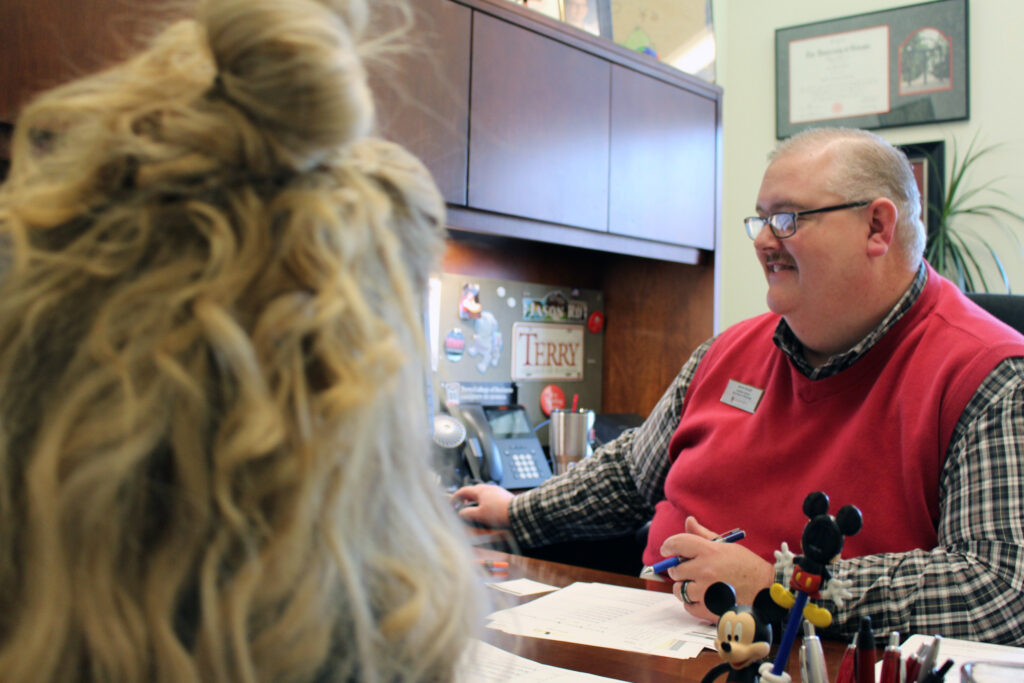They’re career consultants, guidance counselors, HR representatives — sometimes sounding boards for advice. Academic advisors are the guiding lights that keep students moving in the right direction.
“It’s work, but it definitely gets personal,” said Jeremy Jackson, an advisor in the Economics Department. “For some of the students, we’re the only professional adults they talk with who have an interest and an understanding of their academic journey. We know how to get them from where they are now to graduation, and that’s the biggest step in their lives for a lot of them.”
Every Terry student meets with an advisor each semester before they can register for classes. The meetings do more than check boxes; they make sure students are in the right major and getting the most out of the college’s offerings and opportunities.
“The main thing I do is clear students to register for classes, but it’s not the only thing,” said Jason Booth, a former Advisor of the Year who works in the Marketing Department. “I also help them find internships, decide what classes they want to take, and tell them about programs that can help their careers, like sales competitions.”
“A lot of students know what they want to do, but some have no idea,” he added. “They don’t know if they want a single major or if they want to add an area of emphasis, like sales or digital marketing. And when they don’t pass a test or they aren’t doing well, they come in and talk about that.”
Booth sees about 400 marketing majors every semester. He’s one of 14 advisors the college employs to help students with everything from declaring a minor to joining a study abroad trip. Because of the crucial role they play in student success, the college invests a lot in choosing and training the people to do the job well, according to Laura Clark, Terry’s director of undergraduate programs.
“When we hire advisors, I look for people who have a genuine interest in showing care and concern to everyone in their path,” she said. “I seek those who have fascinating life and work experiences that indicate an ability to build and maintain solid professional relationships. Hiring a diverse group of advisors is important to me – diverse in terms of gender, race, age, and also life, college and work experiences.
“We so appreciate that our more experienced academic advisors are always ready and willing to mentor newly hired advisors as they learn the computer programs, processes, policies, majors and programs of study,” she added. “I also encourage all our advisors to take advantage of the many training and networking opportunities available, including Academic Advising Certificate classes, other Training and Development offerings, bi-annual workshops and brown bag lunch-and-learn sessions.”
Nearly every Terry advisor has a candy dish on their desk. It’s one of the many subtle strategies for connecting with students they learn on the job.
“Without advisors, we’d lose the intangibles,” said Laura Nelson, an advisor in the Finance Department. “It’s not written anywhere, but we’re the ones who tell students, ‘You can take these two classes together, but it’s a terrible idea.’ For example, there are two finance classes that can be taken together, but when people do we see a lot of withdrawals because it’s just so overwhelming. I try to help them avoid pitfalls like that.”
Piecing together the right schedule is a puzzle that requires a bird’s-eye view, Nelson said. Advisors guide students toward taking prerequisite classes early on, enrolling in electives at the right time, and snagging popular classes when they become available. Setting up students for success in college and beyond is just part of their day’s work.
“Even though we deal with a lot of students, they’re still special to us,” Booth said. “Seeing them succeed, seeing them find what they’re passionate about and enjoy and then ideally helping them finding that job or at least an internship that will lead to a job, that’s the best part of the job.”

